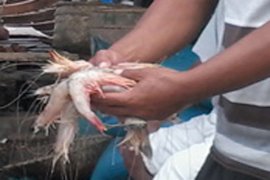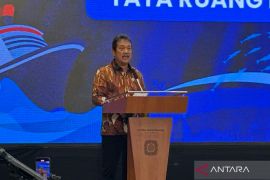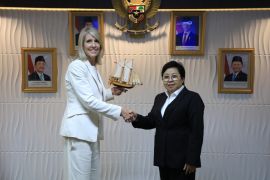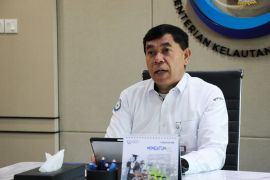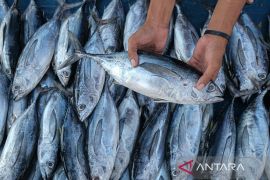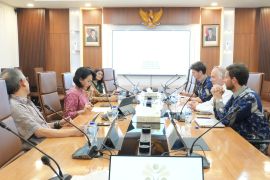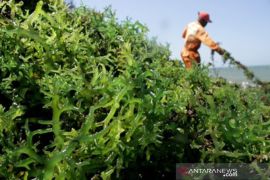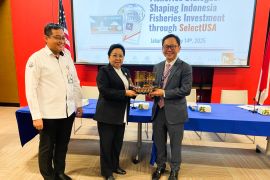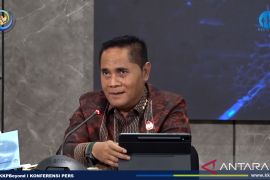This year the exhibition will take place in Boston, USA, on March 6 to 8.
Indonesia is participating in the event with booth number 2565, by involving 478 fishery companies that offer a wide range of fresh and processed fishery products.
These companies come from all over Indonesia, introducing their fishing products which represent the huge Indonesian marine wealth from the western to eastern parts of the country.
Biodiversity has become a trademark of Indonesian marine fishery products. With its sea covering 5.8 square kilometers, this archipelagic nation is a mega biodiversity in the world which has 8,500 species of fish and more than 950 kinds of coral reefs.
Such a marine wealth shows that Indonesia has complete fishery products including big fish, small fish, reef fish, shrimp, lobster, squid, abalone and jellyfish. These sea organisms are unique compared to those found in other waters in the world.
Frozen peeled shrimp, squid, fish dumplings, frozen fish, fresh fish, fresh squid, frozen octopus, pasteurized and canned crab, carrageenan, as well as sea cucumber are among Indonesia's fishery products for exhibits and sales.
All of Indonesian fishery products are certified from the Indonesian Ulema Council (MUI) for halal products, and from Best Aquaculture Practices (BAP) for aqua-culture seafood issued by the Global Aquaculture Alliance (GAA).
In addition to those institutions, HACCP (Hazard Analysis and Critical Control Points) which is a preventative food safety management system also issues such a certificate. Every step in the manufacture, storage and distribution of a food product is analyzed by the system for microbiological, physical and chemical hazards,
ISO 9001 and the certification of Good Manufacturing Practices (GMP) are the standards required in order to conform to the guidelines recommended by agencies that control authorization and licensing for manufacture and sale of food.
The markets for fishery and seafood products in the world are still wide open, but global competition remains unavoidable. Fishery products must have added value, besides the quality.
Safe and Sustainable
Indonesia does not only rely on the diversity and quality of fishery products but the country is also concerned over the security aspect in the process of exploitation by always prioritizing sustainability factor.
"The implementation of the sustainability concept of fishery resources has been carried out from upstream to downstream for fishing, fish handling, transportation, cultivation, processing and compliance with export requirements," Minister of Maritime Affairs and Fisheries, Susi Pudjiastuti, said in Jakarta recently.
She explained that in certain areas in Indonesia, the practice of maintaining sustainability in fishing is based on the traditions and customs which have been carried down hereditary.
In Aceh, there are a system and a tool to manage fishery resources which are called Panglima Laut, whereas Maluku has Sasi, namely, the traditional method of maintaining a moratorium on fishing.
According to Susi, nationally, Indonesia has implemented the Regulation No. 31/2014 which has been converted into the Regulation No. 45/2009 that regulates all aspects of fisheries in Indonesia, including the sustainability of fishery resources.
"Implementation of these regulations is supported by several policies which are more specific to manage quality and safety, traceability ( mechanism to trace products from upstream to downstream) and sustainability," she said.
The concept of sustainability is also applied by Indonesia by issuing a certificate of catches to prevent IUU fishing (Illegal, Unreported, and Unregulated Fishing) in Indonesia's territories.
Indonesia is also a member of Regional Fisheries Management Organizations (RFMOs) that manages fisheries in the waters of a region, and is also active in several world fishery organizations.
Some of these organizations are the Regional Commission for Conservation of Southern Bluefin Tuna (CCSBT), the Indian Ocean Tuna Commission (IOTC) and the Commission for the Western and Central Pacific Fisheries (WCPFC).
Indonesia facilitates private companies to meet market requirements related to eco label, strengthen regional cooperation to support the economic security of fishery resources, to be active in addressing the practice of IUU Fishing, and build campaigns that bring together the stakeholders of national, regional and global for food security and sustainable growth.
Market
The exhibition Seafood Expo North America / Seafood Processing North America is one of the trading gates of Indonesia's fishery products into the global market.
The expansion of the seafood market is also pursued by the Indonesian government through the Coordinating Ministry for Maritime Affairs that facilitates the development of the national seafood market to the United Kingdom (UK) and Northern Ireland.
The program is given as part of a maritime cooperation between the two countries as established in a memorandum of understanding on maritime cooperation on July 27, 2015.
"The UK is our biggest seafood market in Europe. And the EU is contributing 60 percent of the total national seafood market ," said Deputy of Maritime Sovereignty, the Coordinating Ministry for Maritime, Arif Havas Oegroseno, said on the sidelines of Bilateral Maritime Workshop in Jakarta recently.
With such big market, Havas added, the UK becomes the world standard seafood market.
"By collaborating with the country, our shrimps and other fishery products will meet the international standard," he said.
In addition, Havas said, cooperation in the field of marine fisheries between the two countries is also considered an opportunity to introduce Indonesian seafood products.
"Thats why we work together with the UK which is the biggest seafood market in European region," he said.
Indonesia and the UK initiate a cooperation on the maritime sector through a Bilateral Maritime Forum to be held in London in April this year.
(T.B005)
Reporter: Bambang Purwanto
Editor: Aditia Maruli Radja
Copyright © ANTARA 2016
